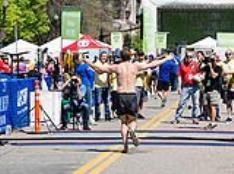Friday: Run 8 miles "as you feel." Finish with 10 x 200m accelerations on the track or on a flat bike path stretch. These 200s should be run at roughly 5K pace with 200-meter slow walk/jog between them.
Saturday: Run easy for as long as you choose.
Weeks 8, 9, 10
Sunday: Coming off the marathon-specific long run of week 7, week 8 (4 weeks out from the marathon) should see a planned race of between 10 miles and a half marathon in lieu of the Sunday long run. With a month to go before the big day, you are likely to find yourself feeling quite tired, as your overall running volume should be at its marathon build-up peak. I recommend running the opening 2 to 3 miles of the race at goal marathon pace—NO FASTER—then conclude the final 1/3 as a race effort. Week 9 is the second of two marathon-specific long runs (see below).
Marathon-Specific Long Run During Week 10 (3 weeks out from marathon)
- Run 3 to 4 miles easy at a controlled conversational pace to start
- Run two separate 5-mile intervals at 5 to 8 seconds per-mile faster than goal marathon pace (recovery between them is an easy mile—1:30-2:00 per-mile slower than goal marathon pace)
- Run 1 mile easy after the second 5-mile piece
- Conclude the session with 1 x 1 mile at or a hair faster than 10K race pace.
- Jog for 2 miles to cool down (18 to 19 miles total)
Once again, remember to find a course that replicates as best as possible the course you are going to be racing. Take in fluid and energy as recommended.
More: The New Rules of Marathon Nutrition: Sports Drink
Monday: Short recovery run or non-run day (rest); optional non-running aerobic exercise—preferably spinning on a stationary bike or a pool session.
Tuesday: Run easy for 6 to 7 miles with 8 x 100m to finish run.
Wednesday: Fartlek set for week 8 (the week you raced) of a simple 4-3-2-1 (minutes) x 2 sets (recovery is half the time of the piece you just ran, and 3:00 between sets). Weeks 9 and 10 should be kilometer repeats—two sets of 4-6 x 1000m—run set 1 at half marathon rhythm and set 2 at 10K rhythm. Each set should have 1:45 rest between kilometer repeats and 4:00 between sets.
Thursday: Run 4 miles (optional non-run workout of a swim or stationary bike spin on little to no resistance) or off day.
Friday: Run 9 to 10 miles "as you feel." Finish with 10 x 200m accelerations on the track or on a flat bike path stretch. These 200s should be run at roughly 5K race pace (this will not feel particularly hard for such a short interval) with a slow 200m jog between each 200.
Saturday: Run easy for as long as you choose.
As you can clearly see, this plan is both aggressive in terms of its attack and specificity; however, if your recovery days are run the right way (particularly in weeks 4 to 10 when your harder days and long run days are more difficult), then you will enter the final two weeks (the taper) intelligently fatigued with legs and lungs ready for a two-week taper into the big day.
In the next article, I discuss two topics: the longer 4- to 5-month marathon plan for those needing more time to prepare as well as perhaps the trickiest and most artful aspect of a marathon build-up: the taper.
More: How to Troubleshoot During Marathon Training
 Sign up for your next marathon.
Sign up for your next marathon.- 5
- of
- 5
About the Author

Get ACTIVE on the Go


Couch to 5K®
The best way to get new runners off the couch and across the finish line of their first 5K.
Available for iOS | Android







Discuss This Article